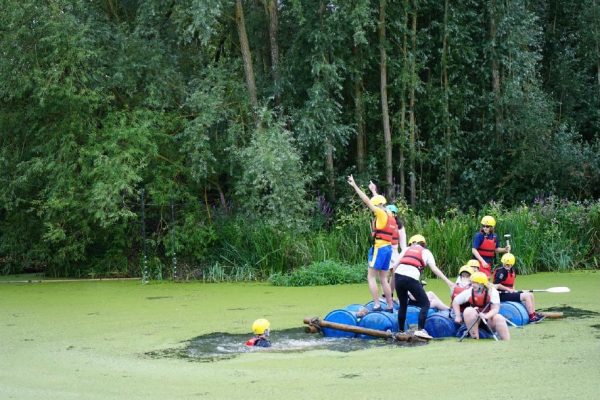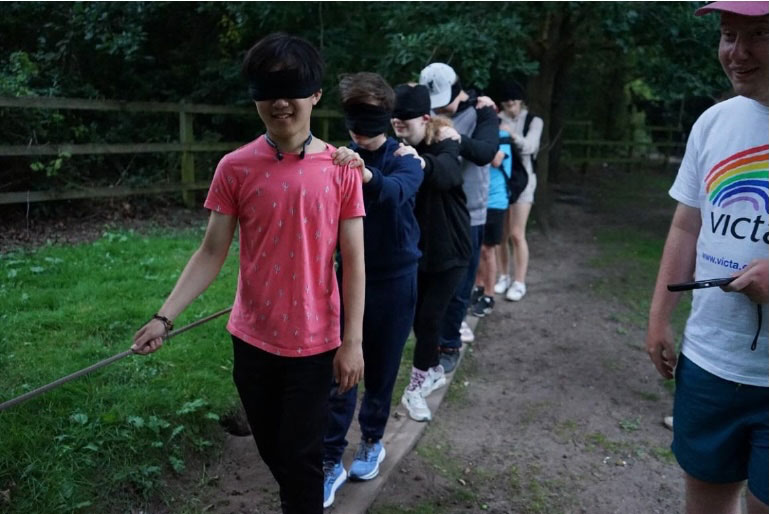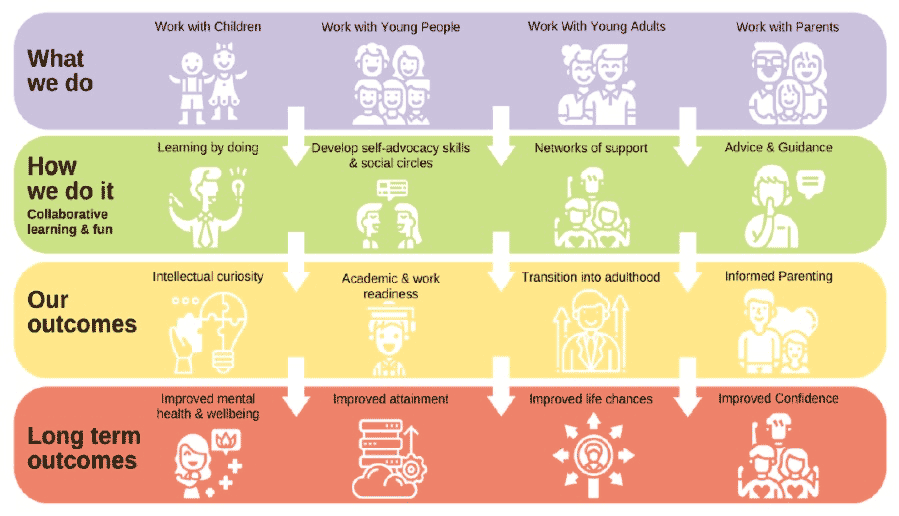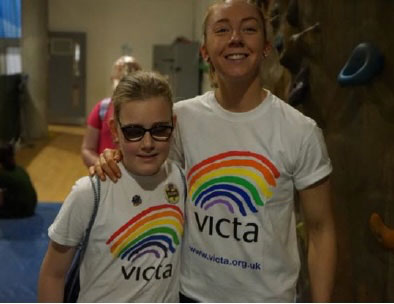
VICTA Youth Programme 2023
With the support of the Vinchel Foundation, VICTA delivered a youth programme for students aged 14 to 17 with a vision impairment. Together we delivered a series of activities, residential camps and expeditions that focused on preparing students for academic and workplace readiness by strengthening social and academic confidence through teamwork and collaboration, fostering positive self-evaluation and self-advocacy, and engendering strong communication skills, resilience, and a good work ethic.
We believe in empowering children and young adults who are blind or partially sighted. Our activities are designed to instil confidence, promote independence, and build social networks to share information and reduce isolation. In getting children and young people involved with our activities, we’re giving them a lifeline. They get the opportunity to explore, learn skills and develop confidence, and help each other toward a more positive future. We are honoured to partner with the Vinchel Foundation.
Nick Schofield, CEO VICTA

Aware that feelings of isolation and loneliness are dominant within the world of vision impairment, we focus on activity-based learning as a positive setting for social interaction and personal growth.
Constructivist models of learning are those in which young people are seen as active participants in the processes of seeking out knowledge, making sense of their experiences and gaining intrinsic satisfaction from learning and solving problems. Constructivist learning is seen to be a transformative experience which creates opportunities for further learning as students gain greater depth of understanding and increasingly flexible ways of representing their knowledge and dealing with new information. Related to this approach is social constructivism. Here a young person’s active role in learning is set in the context of their membership of social groups which jointly create knowledge through their engagement in purposeful and valued activities.

We were fortunate enough to begin our partnership with the Vinchel Foundation in 2023. Working together to support vision impaired young people aged 14-17 across the UK.
This impact report provides:
▪ an overview of our partnership with the Vinchel Foundation in 2023
▪ summary of support provided within VICTA’s Youth Programme
▪ case studies
▪ insights from 2023
▪ financials
▪ 2024 plans and aspirations.
Partnering with the Vinchel Foundation
Within our original proposal we had an ambition to engage with 132 young people, it is pleasing to note that we exceeded this, directly supporting 137 vision impaired young people aged 14-17. We supported young people across 18 in-person and online activities, delivering day and multi-day residentials which provided them opportunities to build confidence and make connections without family members present. Our activities bring together vision impaired young people from across the UK, facilitating collaborative learning, which enables a group to learn and teach each other, growing from each other’s shared experiences and stories and celebrating success together. Vitally, our activities develop high-level thinking, communication, self-management and leadership skills in a safe peer-to-peer environment. Our partnership placed the wellbeing of the young people we support at the centre of what we do, with tailored self-care (sleep and haircare) and upskilling (Spanish language) workshops. Moreover, all awards, competitions and participation in activities are saved digitally on the ‘Vault’, an accessible online passport – a database which our young people can access and contribute to at any time, to recognise their achievements and personal development. As and when they come to prepare and write their personal statements for a move into further or higher education, or indeed the workplace, they have all the information and evidence they need to build interesting and meaningful statements about themselves and their achievements. We want them rather than their disability to stand out.
We provided opportunities for young people to develop greater communication skills and increased confidence, strengthening their ability to self-advocate. Throughout the year of our partnership, students aged 14-17 had the opportunity to receive up to 3 nationally recognised award schemes. The Arts Award inspires young people to grow their arts and leadership talents through the participation in a variety of art forms, such as fashion, digital art, pottery and poetry. With the help of the Vinchel Foundation, we were able to provide creative opportunities for young people, often activities which people have assumed they cannot participate in, to create a sense of accomplishment and help them to manage mood and regulate stress. The John Muir Award is an environmental award scheme focused on encouraging awareness and responsibility for the natural environment. With your support we were able to inspire greener living and environmentally friendly lifestyles that support increased well-being. The Duke of Edinburgh Award allows young people to demonstrate commitment, resilience, perseverance, personal growth, and leadership, and how they have turned potential into accomplishment. Through supporting this programme, we have helped young people achieve the Duke of Edinburgh’s Award, a fantastic award which is recognised and favoured on personal statements, scholarships and CVs. The award gives them an opportunity to talk about themselves and their passions outside of formal education. Vitally, receiving these awards allows them to show that their sight loss did not get in the way of their achievements.

We helped young people challenge limitations presumptions that they and others have about their abilities, and to build a sense of self-accomplishment. The connections and shared experiences gained on our activities provide unique opportunities for social connectivity and peer-to-peer support and encouragement. The variety of backgrounds and experiences of those who attend our activities from across the UK, provides a unique experience which exposes young people to sets of views and behaviours outside their ‘norm’, broadens their perspective, reduces their feelings of isolation/loneliness and allows them to learn about themselves.
The reality of young people with sight loss
There are an estimated 41,000 blind and partially sighted children and young people in England and Wales, 10,000 of whom have severe visual impairment (RNIB, 2023). These young people face social, educational, and financial challenges. Many report being unhappy with their life because of their sight loss, they are more likely to be bullied, and the majority of their parents are worried about their ability to learn at school.
Mental health impact
▪ Evidence has found that people who are blind or partially sighted are two to three times more likely to be depressed than people who are not vision impaired (English Longitudinal Study of Ageing, 2008).
▪ The Great Ormond Street Institute of Child Health who in 2018 presented research that showed how children aged between eight and 11 years old who live with a vision impairment are three times more likely to develop a mental health problem than children with no vision impairment. And a third of these children are at high risk of anxiety or mood disorders with around half showing difficulties in quality of life or adaptive behaviour Great Ormond Street Institute of Child Health, 2018).
▪ There is a consistent pattern of lower wellbeing and poorer mental health reported by the parents of teenagers with vision impairments at age 14, and by the young people themselves at age 17. At age 14, vision impairment teenagers are more than twice as likely to often be unhappy, downhearted or tearful (46% vs. 20%). At age 17, vision impaired teenagers are more than six times as likely to say they feel hopeless all or most of the time (46% vs. 7%). Half report feeling depressed all or most of the time compared to less than 10% of sighted peers. The ‘Campaign to End Loneliness’ report found that those aged between 16-29 are over two times more likely to report feeling lonely often (RNIB, 2023).
Educational impact
▪ Young people with vision impairments have lower educational attainment than those without special educational needs (SEN). In Key Stage 4 (14–16-year-olds) where students are completing their GCSEs, there is a 21% attainment gap (RNIB, 2022).
▪ While young people with vision impairments appear to remain in education for longer than their peers (according to the Labour Force Survey, 36.2% of 16-25 year-olds were students compared with 25.8% of all 16-25 year olds (25)), this extra time in education is not necessarily being used productively (Labour Force Survey, 2023).
▪ There is evidence from the Birmingham University longitudinal transitions research, of young people with vision impairments in further education ‘churning’, i.e. repeating years in college, or repeatedly taking courses at the same level (or even lower levels) and failing to progress (University of Birmingham, 2021).
Economic impact
▪ Blind and partially sighted people with a degree or higher still only have the same chance of getting a job as someone with no qualifications in the general population (RNIB, 2017). The employment rate is 76% for the general population and 27% for people registered blind and partially sighted. Blind and partially sighted people with no qualifications have an employment rate of 8% (RNIB, 2020).
▪ Young people aged 16-25 with sight loss are almost twice as likely as the general population to be in neither employment, education or training (20% vs. 12%). The employment rates for young people aged 16-25 with sight loss are lower than those of their age peers (25.6% vs 54.0%), and the difference is not accounted for by the higher proportion of vision impaired students in education (RNIB, 2020).
▪ Overall, only 62% of young people with vision impairments aged 16-25 were in education or employment compared with 80% of the general population of 16–25-year-olds (University of Birmingham, 2021).
VICTA Summer Camp
The VICTA Summer Camp is the highlight of the Youth Programme. It is an 8-day residential which this year supported 25 vision impaired young people. The camp provided these young people with an opportunity to take part in adrenaline inducing and problem-solving outdoor activities such as raft-building and climbing. They were able to interact with and investigate the natural world and earn the John Muir Award. The John Muir Award is an environmental award scheme focused on wild places. It is inclusive, accessible and non-competitive and encourages awareness and responsibility for the natural environment through a structured yet adaptable scheme, in a spirit of fun, adventure and exploration.
We have a range of students from different background and educational settings join our Summer Camp, the majority of whom attend express a desire to expand their social network and challenge themselves.
As Miriam, mother of Tamzin explained:
There are so few activities or clubs available for my daughter to participate, the availability so many activities for her to be included in, is the best thing about Summer Camp. She had a wonderful time, it was a huge step outside her comfort zone to attend and the activities challenged her both mentally and physically. The activity day has given her a much-needed boost to her self-esteem and confidence. Many thanks to everybody involved.
Matthew’s (a 16-year-old with Bilateral Microphthalmia, Coloboma & Nystagmus) mother explained before attending our Summer Camp this year:
Matthew has very limited social opportunities (outside of school), particularly with other vision-impaired peers. He struggles to initiate conversations with unfamiliar peers. We hope his general confidence will improve.
After attending camp, we asked Matthew about his experience, he explained:
I had a fun week, there’s lots of great people to be around, especially if it’s your first time away from home. It was a brilliant boost for my independence and I learned how to age a tree!
He reported feeling that his negotiation, decision-making and communication skills had improved and has plans to join an accessible theatre club in his local area.
The positive impact of VICTA’s Summer Camp can be showcased by feedback we received from the variety of young people who attended:
I feel more independent and more motivated than before I went. My Mum said she has really noticed the difference in me since coming home. (Amy, aged 17)
I am able to adapt to new experiences, look after myself. (Josh, aged 14)
Read the VICTA Youth Programme 2023 End of Year Report (FULL)
Read the VICTA 2023 Youth Programme Impact Report (compressed)